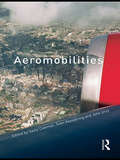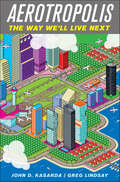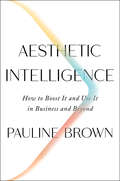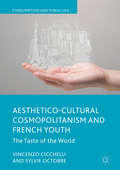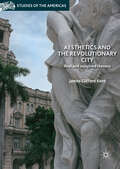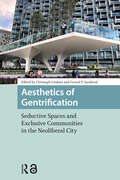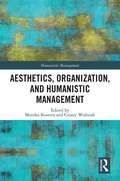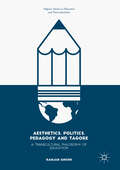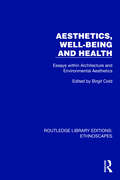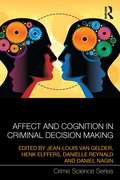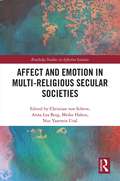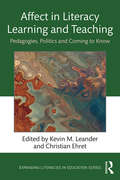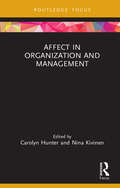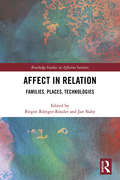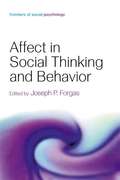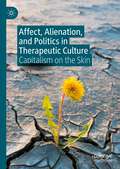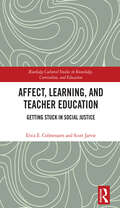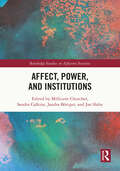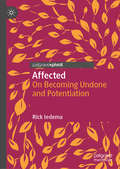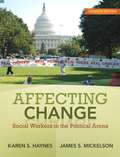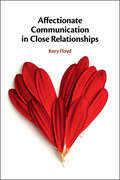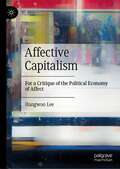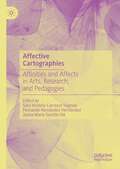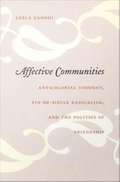- Table View
- List View
Aeromobilities (International Library of Sociology)
by John Urry Sven Kesselring Saulo CwernerAeromobilities is a collection of essays that tackle in many different ways the growing importance of aviation and air travel in our hypermobile, globalized world. Providing a multidisciplinary focus on issues ranging from global airports to the production of airspace, from airline work to helicopters, and from movement in airports to software systems, Aeromobilities seeks to enhance our understanding of space, time and mobility in the age of mass air travel. From Sao Paulo to Sydney, Aeromobilities draws on local experiences of airspaces to generate theory and research that are global in scope. It is the first book of its kind, bringing together a wide range of theoretical and methodological approaches to aviation and air travel in the social sciences and humanities, while emphasizing the central role of aeromobilities in contemporary social relations. In a world where virtually every aspect of social life is touched upon, in one way or another, by the complex global network of airline flows, with its large passenger aircraft and iconic international airports, Aeromobilities provides innovative analyses of some of the most fundamental and influential mobility networks of our time.
Aerotropolis: The Way We'll Live Next
by Greg Lindsay John D. KasardaThis brilliant and eye-opening look at the new phenomenon called the aerotropolis gives us a glimpse of the way we will live in the near future—and the way we will do business too. Not so long ago, airports were built near cities, and roads connected the one to the other. This pattern—the city in the center, the airport on the periphery— shaped life in the twentieth century, from the central city to exurban sprawl. Today, the ubiquity of jet travel, round-the-clock workdays, overnight shipping, and global business networks has turned the pattern inside out. Soon the airport will be at the center and the city will be built around it, the better to keep workers, suppliers, executives, and goods in touch with the global market. This is the aerotropolis: a combination of giant airport, planned city, shipping facility, and business hub. The aerotropolis approach to urban living is now reshaping life in Seoul and Amsterdam, in China and India, in Dallas and Washington, D.C. The aerotropolis is the frontier of the next phase of globalization, whether we like it or not. John D. Kasarda defined the term "aerotropolis," and he is now sought after worldwide as an adviser. Working with Kasarda's ideas and research, the gifted journalist Greg Lindsay gives us a vivid, at times disquieting look at these instant cities in the making, the challenges they present to our environment and our usual ways of life, and the opportunities they offer to those who can exploit them creatively. Aerotropolis is news from the near future—news we urgently need if we are to understand the changing world and our place in it.
Aesthetic Intelligence: How to Boost It and Use It in Business and Beyond
by Pauline BrownLongtime leader in the luxury goods sector and former Chairman of LVMH Moët Hennessy Louis Vuitton North America reinvents the art and science of brand-building under the rubric of Aesthetic Intelligence. In a world in which people have cheap and easy access to most goods and services, yet crave richer and more meaningful experiences, aesthetics has become a key differentiator for most companies and a critical factor of their success and even their survival. In this groundbreaking book, Pauline Brown, a former leader of the world’s top luxury goods company and a pioneer in identifying the role of aesthetics in business, shows executives, entrepreneurs, and other professionals how to harness the power of the senses to create products, services, and experiences that stand out, resonate with their customers, and create long-term value for their businesses. The power is rooted in Aesthetic Intelligence—or “the other AI,” as Brown refers to it. Aesthetic Intelligence can be learned. Indeed, people are born with far more capacity than they use, but even those that are naturally gifted must continue to refine their skills, lest their aesthetic advantage atrophy. Through a combination of storytelling and practical advice, the author shows how aesthetic intelligence creates business value and how executives, entrepreneurs and others can boost their own AI and successfully apply it to business. Brown offers research, strategies and practical exercises focused on four essential AI skills. Aesthetic Intelligence provides a crucial roadmap to help business leaders build their businesses in their own authentic and distinctive way. Aesthetic Intelligence is about creating delight, lifting the human spirit, and rousing the imagination through sensorial experiences.
Aesthetico-Cultural Cosmopolitanism and French Youth: The Taste Of The World (Consumption And Public Life Ser.)
by Vincenzo Cicchelli Sylvie OctobreBy examining cultural consumption, tastes and imaginaries as a means of relating to the world, this book describes the effects of globalization on young people from an aesthetic and cultural perspective. It employs the concept of aesthetico-cultural cosmopolitanism to analyse the emergence of an aesthetic openness to alterity as a new generational "good taste". Aesthetico-Cultural Cosmopolitanism and French Youth critically examines the consumption of cultural products and imaginaries that provide genuine insight into social change, particularly in regards to young people, who play the largest role in cultural circulation. This book will be of interest to students and academics across a wide range of readers, including cultural theorists, and students engaged in debates on cultural consumption, the globalization of culture and transnational aesthetic codes.
Aesthetics and the Revolutionary City: Real and Imagined Havana (Studies of the Americas)
by James Clifford KentAesthetics and the Revolutionary City engages in alternative ways of reading foreign visual representations of Havana through analysis of advertising images, documentary films, and photographic texts. It explores key narratives relating to the projection of different Havana imaginaries and focuses on a range of themes including: pre-revolutionary Cuba; the dream of revolution; and the metaphor of the city “frozen-in-time.” The book also synthesizes contemporary debates regarding the notion of Havana as a real and imagined city space and fleshes out its theoretical insights with a series of stand-alone, important case studies linked to the representation of the Cuban capital in the Western imaginary. The interpretations in the book bring into focus a range of critical historical moments in Cuban history (including the Cuban Revolution and the “Special Period”) and consider the ways in which they have been projected in advertising, documentary film and photography outside the island.
Aesthetics of Gentrification: Seductive Spaces and Exclusive Communities in the Neoliberal City (Cities and Cultures)
by Ming Zhang Mahtab AhmadGentrification is reshaping cities worldwide, resulting in seductive spaces and exclusive communities that aspire to innovation, creativity, sustainability, and technological sophistication. Gentrification is also contributing to growing social-spatial division and urban inequality and precarity. In a time of escalating housing crisis, unaffordable cities, and racial tension, scholars speak of eco-gentrification, techno-gentrification, super-gentrification, and planetary gentrification to describe the different forms and scales of involuntary displacement occurring in vulnerable communities in response to current patterns of development and the hype-driven discourses of the creative city, smart city, millennial city, and sustainable city. In this context, how do contemporary creative practices in art, architecture, and related fields help to produce or resist gentrification? What does gentrification look and feel like in specific sites and communities around the globe, and how is that appearance or feeling implicated in promoting stylized renewal to a privileged public? In what ways do the aesthetics of gentrification express contested conditions of migration and mobility? Addressing these questions, this book examines the relationship between aesthetics and gentrification in contemporary cities from multiple, comparative, global, and transnational perspectives.
Aesthetics, Organization, and Humanistic Management (Humanistic Management)
by Monika KosteraThis book is a reaction to the reductionist and exploitative ideas dominating the mainstream contemporary management discourse and practice, and an attempt to broaden the horizons of possibility for both managers and organization scholars. It brings together the scholarly fields of humanistic management and organizational aesthetics, where the former brings in the unshakeable focus on the human condition and concern for dignity, emancipation, and the common good, while the latter promotes reflection, openness, and appreciation for irreducible complexity of existence. It is a journey towards wholeness undertaken by a collective of management and organization theorists, philosophers, artists, and art curators. Reading this book’s contributions can help both academics and practitioners work towards building organizational practices aimed at (re)acquiring wholeness by developing aesthetic awareness allowing for more profound understandings of performativity, insights into the dynamics of power, appreciation of ambiguity and ambivalence, and a much needed grasp of complexity. The varied ways of engaging with art explored by the authors promote imaginative insights into and reflection on the beauty and vicissitudes of organizing, of management knowledge and collective expression. It will be of interest to researchers, academics, practitioners, and students in the fields of organizational theory and practice, business and management history, human resource management, and culture management.
Aesthetics, Politics, Pedagogy and Tagore: A Transcultural Philosophy of Education (Palgrave Studies in Education and Transculturalism)
by Ranjan GhoshThis book provides a radical rethinking of the prominent Indian thinker Rabindranath Tagore, exploring how his philosophy of education relates to the ideas of Western theorists such as Kant, Plato and Aristotle. Tagore's thoughts on pedagogy, university and formal education are subjected to a fascinating critique within Ghosh's transcultural framework, referencing a wide range of thinkers across varying time periods, places, and cultures, and developing a greater sensitivity to other traditions, languages, and forms of thinking and writing. The book changes the way we have so far thought about the educationist Tagore, and will be of interest to scholars and specialists of literature, Indian history, and philosophy of education. It is political, deeply philosophical and has a transcultural take on our understanding of a variety of issues relating to Tagore and to philosophy of education in general.
Aesthetics, Well-being and Health: Essays within Architecture and Environmental Aesthetics (Routledge Library Editions: Ethnoscapes)
by Birgit ColdIn everyday life, most people do not reflect seriously on the impacts of architecture and environmental aesthetics on their well-being and health. Originally published in 2001 as part of the Ethnoscapes: Current Challenges in the Environmental Social Sciences series, reissued now with a new series introduction, Aesthetics, Well-being and Health: Essays within Architecture and Environmental Aesthetics, is an intriguing volume bringing together professionals working in architecture, planning, urban design and social policy with academics from both humanities and social sciences to provide a broad-based and insightful discussion on how aesthetics affect us emotionally and physically. The essays help us understand our cultural and individual preferences related to the quality of the environment and challenge the common belief that environmental beauty is a matter of personal taste. A wide range of concepts are discussed such as place identity, multi-sensuous and emotional processes, geometrical order and controlled space, architectural plasticity, aesthetically real and virtual values, participative design processes, ethics in architecture, and beauty and happiness. The book highlights the importance for today's society to engage more in aesthetic ethics and to understand the significance of creating aesthetically pleasing environments.
Affect and Cognition in Criminal Decision Making: Between Rational Choices And Lapses Of Self-control (Crime Science Series)
by Danielle Reynald Jean-Louis Van Gelder Henk Elffers Daniel NaginResearch and theorizing on criminal decision making has not kept pace with recent developments in other fields of human decision making. Whereas criminal decision making theory is still largely dominated by cognitive approaches such as rational choice-based models, psychologists, behavioral economists and neuroscientists have found affect (i.e., emotions, moods) and visceral factors such as sexual arousal and drug craving, to play a fundamental role in human decision processes. This book examines alternative approaches to incorporating affect into criminal decision making and testing its influence on such decisions. In so doing it generalizes extant cognitive theories of criminal decision making by incorporating affect into the decision process. In two conceptual and ten empirical chapters it is carefully argued how affect influences criminal decisions alongside rational and cognitive considerations. The empirical studies use a wide variety of methods ranging from interviews and observations to experimental approaches and questionnaires, and treat crimes as diverse as street robbery, pilfering, and sex offences. It will be of interest to criminologists, social psychologists, judgment and decision making researchers, behavioral economists and sociologists alike.
Affect and Emotion in Multi-Religious Secular Societies (Routledge Studies in Affective Societies)
by Christian Von Scheve Anna Lea Berg Meike Haken Nur Yasemin UralEmotions have moved center stage in many contemporary debates over religious diversity and multicultural recognition. As in other contested fields, emotions are often one-sidedly discussed as quintessentially subjective and individual phenomena, neglecting their social and cultural constitution. Moreover, emotionality in these debates is frequently attributed to the religious subject alone, disregarding the affective anatomy of the secular. This volume addresses these shortcomings, bringing into conversation a variety of disciplinary perspectives on religious and secular affect and emotion. The volume emphasizes two analytical perspectives: on the one hand, chapters take an immanent perspective, focusing on subjective feelings and emotions in relation to the religious and the secular. On the other hand, chapters take a relational perspective, looking at the role of affect and emotion in how the religious and the secular constitute one another. These perspectives cut across the three main parts of the volume: the first one addressing historical intertwinements of religion and emotion, the second part emphasizing affects, emotions, and religiosity, and the third part looking at specific sensibilities of the secular. The thirteen chapters provide a well-balanced composition of theoretical, methodological, and empirical approaches to these areas of inquiry, discussing both historical and contemporary cases.
Affect in Literacy Learning and Teaching: Pedagogies, Politics and Coming to Know (Expanding Literacies in Education)
by Kevin M. Leander Christian EhretIn this cutting-edge volume, scholars from around the world connect affect theory to the field of literacy studies and unpack the role and influence of this emerging area of scholarship on literacy education. Offering an introduction to affect theory and scholarship as it relates to literacy studies, contributors discuss the role of humanizing and dehumanizing influences on schooling and examine the emotional and affective dimensions at individual and communal levels. Arguing that an affective turn requires a radical rethinking of the nature of literacy, these chapters address the impact and import of emotion and affect on reading, writing and calling to action. Grounded in trailblazing research, the contributors push the boundaries of academic writing and model how theoretically-driven writing about affect must itself be moving and expressive.
Affect in Organization and Management (Routledge Focus on Women Writers in Organization Studies)
by Carolyn Hunter Nina KivinenAffect in Organization and Management asks how affect theory understands everyday working lives through embodied, social and political practice. Discussing a range of dimensions and perspectives on affect, the book considers how subjects are formed through their connections with others, both human and non- or more-than-human. The six women writers on affect presented in this series (Sara Ahmed, Kathleen Stewart, Donna Haraway, Jane Bennett, Karen Barad and Rosalyn Diprose) all speak to important themes in organization studies, including power, politics and ethics. Each chapter explores how these thinkers have already influenced organization scholars, as well as how their work can extend our understanding of pressing organizational issues around gender, race, the environment, leadership and ethics. Feminism is a core feature of this collection, highlighting feminist writing with affective, connected and intersubjective possibilities. Each woman writer is introduced by experts on affect and organization studies. The chapters also suggest further reading and accessible resources. The book is suitable for students, academics and practitioners in business and management, organization studies and critical management studies who want to think differently about organizations.
Affect in Relation: Families, Places, Technologies (Routledge Studies in Affective Societies)
by Birgitt Röttger-Rössler Jan SlabyDecades of research on affect and emotion have brought out the paramount importance of affective processes for human lives. Affect in Relation brings together perspectives from social science and cultural studies to analyze the formative, subject constituting potentials of affect and emotion. Relational affect is understood not as individual mental states, but as social-relational processes that are both formative and transformative of human subjects. This volume explores relational affect through a combination of interdisciplinary case studies within four key contexts: Part I: “Affective Families” deals with the affective dynamics in transnational families who are scattered across several regions and nations. Part II: “Affect and Place” brings together work on affective place-making in the contexts of migration and in political movements. Part III: “Affect at Work” analyzes the affective dimension of contemporary white-collar workplaces. Part IV: “Affect and Media” focuses on the role of media in the formation and mobilization of relational affect. In its transdisciplinary spirit, analytical rigor and focus on timely and salient global matters, Affect in Relation consolidates the field of affect studies and opens up new avenues for scholarly and practical co-operation. It will appeal to both students and postdoctoral researchers interested in fields such as anthropology, sociology, cultural studies, media studies and human development.
Affect in Social Thinking and Behavior (Frontiers of Social Psychology)
by Joseph P. ForgasThe role of affect in how people think and behave in social situations has been a source of fascination to laymen and philosophers since time immemorial. Surprisingly, most of what we know about the role of feelings in social thinking and behavior has been discovered only during the last two decades. Affect in Social Thinking and Behavior reviews and integrates the most recent research and theories on this exciting topic, and features original contributions reviewing key areas of affect research from leading researchers active in the area.The book covers fundamental issues, such as the nature and relationship between affect and cognition, as well as chapters that deal with the cognitive antecedents of emotion, and the consequences of affect for social cognition and behavior.This volume offers a highly integrated and comprehensive coverage of this field, and is suitable as a core textbook in advanced courses dealing with the role of affect in social cognition and behavior.
Affect, Alienation, and Politics in Therapeutic Culture: Capitalism on the Skin
by Suvi SalmenniemiThis book contributes to research on therapeutic culture by drawing on longstanding ethnographic work and by offering a new theoretical reading of therapeutic culture in today's society. It suggests that the therapeutic field serves as a key site in which a number of contradictions of capitalism are confronted and lived out. It shows that therapeutic engagements are inherently ambivalent and contradictory, as they can be articulated and engaged with in many different ways and harnessed for diverse, and often contradictory, political projects. The book takes issue with the interpretation of therapeutic culture as merely individualising, depoliticizing and working in congruence with neoliberalism, and shows that therapeutic engagements may also open up a space for contestation and critique of neoliberal capitalism, animate collective action for social change and articulate alternative forms of life and subjectivities. The book will speak to a wide variety of audiences in the social sciences and will be of particular interest to those working in the fields of sociology, anthropology, critical psychology, cultural studies, gender studies, and critical social theory.
Affect, Learning, and Teacher Education: Getting Stuck in Social Justice (Routledge Cultural Studies in Knowledge, Curriculum, and Education)
by Erica E. Colmenares Scott JarvieThis volume inquires into student teachers’ “stuck moments”—moments of felt crisis—as they occur within the context of a university-based social justice teacher education (SJTE) program. The book complicates the notion that these stuck moments are primarily effects of a gap between theory and practice. Instead, Colmenares and Jarvie argue for a more robust conceptualization, drawing on affect theory, posthumanism, and Deleuzian scholarship. By considering what stuck moments do, and do to, student teachers, the book reimagines SJTE in ways that are both responsive to stuckness and disruptive of discourses of learning that dominate the field. Through a critique of the affective workings of learning, the authors consider how these discourses can prove counterproductive for the work of teaching for social justice. This insightful and stimulating volume will be of use to scholars, researchers, and students with interests in curriculum studies, affective approaches to education and SJTE.
Affect, Power, and Institutions (Routledge Studies in Affective Societies)
by Jan Slaby Sandra Calkins Millicent Churcher Jandra BöttgerThis volume advances a comprehensive transdisciplinary approach to the affective lives of institutions – theoretical, conceptual, empirical, and critical. With this approach, the volume foregrounds the role of affect in sustaining as well as transforming institutional arrangements that are deeply problematic. As part of its analysis, this book develops a novel understanding of institutional affect. It explores how institutions produce, frame, and condition affective dynamics and emotional repertoires, in ways that engender conformance or resistance to institutional requirements. This collection of works will be important for scholars and students of interdisciplinary affect and emotion studies from a wide range of disciplines, including social sciences, cultural studies, social and cultural anthropology, organizational and institution studies, media studies, social philosophy, aesthetics, and critical theory.
Affected: On Becoming Undone and Potentiation
by Rick IedemaThis book explores the implications and relevancies of personal affect and organisational complexity for navigating organisational processes, relationships, changes and aspirations. In today’s climate, worker roles, relations and responsibilities are becoming increasingly complex and variable. Using personal experiences of organisational conflict as a point of departure, this book reflects on organisational change, complexity and research.It moves from experiential towards theoretical and methodological issues, exploring the question of how to confront and intervene in organisational complexity. Among others, the main theories brought to bear on this question include complexity theory, affect theory and sphere theory (or ‘spherology’). The research approaches and methodologies discussed include anthropology/ethnography, discourse studies, visual research and (the turn to) participatory enquiry.The book’s main message is to advocate for a collaborative, affective, visualised and future-oriented research agenda that rejects the conventional objectivist break and ‘division of learning’ characterising researcher-researched relationships. It will appeal to students and academics working in the fields of alternative research methods, the social sciences, organisational studies and management theory.
Affecting Change: Social Workers in the Political Arena
by Karen S. Haynes James S. MickelsonUpdated to reflect advances in a changing political arena of Obama's administration, this revision shows students how to develop political action skills and to take advantage of the opportunity of change. This practical, step-by-step guide focuses on advocacy as the central mission of social work practice. New material and 17 new personal scenarios involving social workers who have made a difference-senators, representatives, and officials in the political arena-serve to inspire students. Revised chapters show how social work skills can be most effective, whether by impacting the political arena as a social worker or running for office.
Affectionate Communication in Close Relationships
by Kory FloydFew communication behaviors are more consequential to the development and maintenance of close relationships than the expression of affection. Indeed, people often use affectionate gestures to initiate or accelerate relationship development. In contrast, the absence of affection in established relationships frequently coincides with relational deterioration. This text explores the scientific research on affection exchange that has emerged from the disciplines of communication, social and clinical psychology, family studies, psychophysiology, sociology, nursing, and behavioral health. Specific points of focus include the individual and relational benefits - including health benefits - of affectionate behavior, the significant detriments associated with lacking sufficient affection, and the risks of expressing affection. It also discusses the primary social and cultural influences on affection exchange, critiques principal theories and measurement models, and offers suggestions for future empirical research.
Affective Capitalism: For a Critique of the Political Economy of Affect
by Hangwoo LeeDrawing on Tarde's and Deleuze’s monadology, this book investigates the affective turn of contemporary capitalism. The concept of affect provides critical insight to overcome the limitations of social constructivism and cognitive capitalism. Affective capitalism transforms the population’s everyday bodily experiences into quantitative metrics that can be observed, measured, and processed on a non-conscious register, turning them into dividuals prepared to react and be affected by specific information at a given moment. In an era where social wealth increasingly relies on the 'social factory,' algorithms and big data constitute the living labor beyond employment. This book argues that affect also holds a potential for dismantling today’s real subsumption of life by capital. The network effect, mostly actualized as a company's market capitalization, is constantly traversed by the molecular becoming of affect, leading to new assemblages, such as free software movement, decentralized platforms, peer-to-peer networking, blockchain, and universal basic income.
Affective Cartographies: Affinities and Affects in Arts, Research, and Pedagogies
by Sara Victoria Carrasco Segovia Fernando Hernández Hernández Juana María Sancho-GilThis book focuses on cartographies as epistemology and visual strategy, highlighting three major axes: corporeal, affective, and nomadic learning. Based on the onto-episte-methodological and ethical displacement from reductive approaches, the book emphasizes new ways of understanding arts, research, teaching and learning processes at the university and beyond. Contributions highlight practices focused on dialogue, sharing, readings and philosophical discussions which allow educators to move away from what is typically thought of as ‘correct’, and reinforce the importance of a decolonized approach to learning and knowledge, understanding the (re)search process as an imperfect journey in becoming.
Affective Communities in World Politics
by Emma HutchisonEmotions underpin how political communities are formed and function. Nowhere is this more pronounced than in times of trauma. The emotions associated with suffering caused by war, terrorism, natural disasters, famine and poverty can play a pivotal role in shaping communities and orientating their politics. This book investigates how 'affective communities' emerge after trauma. Drawing on several case studies and an unusually broad set of interdisciplinary sources, it examines the role played by representations, from media images to historical narratives and political speeches. Representations of traumatic events are crucial because they generate socially embedded emotional meanings which, in turn, enable direct victims and distant witnesses to share the injury, as well as the associated loss, in a manner that affirms a particular notion of collective identity. While ensuing political orders often re-establish old patterns, traumatic events can also generate new 'emotional cultures' that genuinely transform national and transnational communities.
Affective Communities: Anticolonial Thought, Fin-de-Siècle Radicalism, and the Politics of Friendship
by Leela Gandhi"If I had to choose between betraying my country and betraying my friend, I hope I should have the guts to betray my country. " So E. M. Forster famously observed in his Two Cheers for Democracy. Forster's epigrammatic manifesto, where the idea of the "friend" stands as a metaphor for dissident cross-cultural collaboration, holds the key, Leela Gandhi argues in Affective Communities, to the hitherto neglected history of western anti-imperialism. Focusing on individuals and groups who renounced the privileges of imperialism to elect affinity with victims of their own expansionist cultures, she uncovers the utopian-socialist critiques of empire that emerged in Europe, specifically in Britain, at the end of the nineteenth century. Gandhi reveals for the first time how those associated with marginalized lifestyles, subcultures, and traditions--including homosexuality, vegetarianism, animal rights, spiritualism, and aestheticism--united against imperialism and forged strong bonds with colonized subjects and cultures. Gandhi weaves together the stories of a number of South Asian and European friendships that flourished between 1878 and 1914, tracing the complex historical networks connecting figures like the English socialist and homosexual reformer Edward Carpenter and the young Indian barrister M. K. Gandhi, or the Jewish French mystic Mirra Alfassa and the Cambridge-educated Indian yogi and extremist Sri Aurobindo. In a global milieu where the battle lines of empire are reemerging in newer and more pernicious configurations, Affective Communities challenges homogeneous portrayals of "the West" and its role in relation to anticolonial struggles. Drawing on Derrida's theory of friendship, Gandhi puts forth a powerful new model of the political: one that finds in friendship a crucial resource for anti-imperialism and transnational collaboration.
